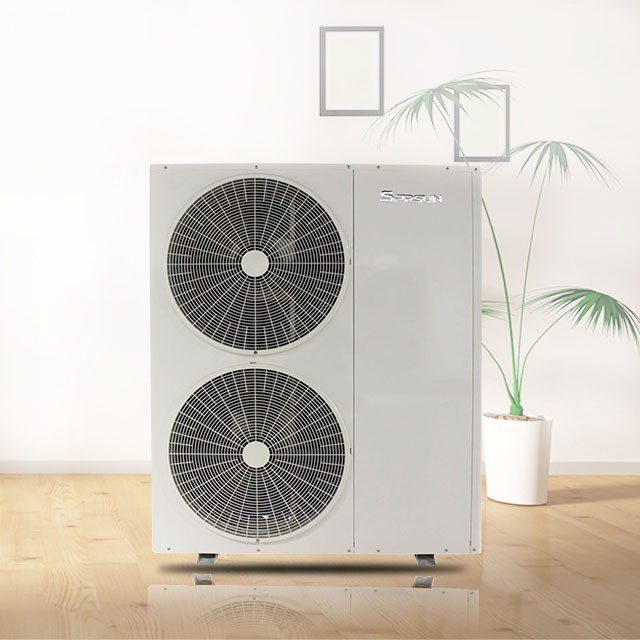Views: 169 Author: Site Editor Publish Time: 2021-05-31 Origin: Site
No. Whereas it works essentially like an air conditioner, a heat pump is a versatile and unique gadget with an extra feature to boasts. Technically, a heat pump plays a special role in reversing cold days, which allows heating instead of cooling the house.
However, it's pretty common to mistake a heat pump system for a furnace or air conditioner, especially if you don't understand the basics of how it works. Our next section focuses on laying down the basics of a heat pump system, differentiating it from an AC, and the benefits of such a system. Here are the essentials to understanding a heat pump system.

Simply put, a heat pump system is an HVAC equipment that provides you with heating and cooling needs through mechanical energy. The system uses electricity to transfer heat from an ideal space like the outdoors into your warm house during heat season with a heat pump.
The reverse happens for the cooling season, with the heat pump now working to remove heat from your cool indoors to the warm outdoors. This sums up a heat pump as a system that moves heat between spaces rather than generates it, providing excellent space and energy efficiency.
A heat pump system comprises different components that help achieve the heat transfer principle in use. In particular, the system is made up of two parts, a split design having an indoor air control handler and an outdoor unit. Aside from this, the components also working in a heat pump system include:
Air ducts allow the flow of both hot and cold air through the spaces
Compressor systems to move the refrigerant throughout the heat pump
Heat strips for extra heat production during cold days
Coils (condenser and evaporator coil) to heat and cool the air through the system
A reversing valve which diverts the refrigerant flow
Refrigerant lines to transfer the refrigerant to outdoor and indoor components
The reversing valve remains one of the most critical components, considering the feature allows the heat pump to absorb energy from outdoors and then release it indoors.
Under many circumstances, a heat pump does function the same as conventional air conditioners. However, this is only in the cooling mode that a heat pump works like an air conditioner since they share the closed-loop refrigeration cycle on both systems. In particular, when it's hot outside is when an air conditioner and an air to water heat pump will use the exact mechanism to pump cool air to your indoors. This shared principle works to keep you cool in both systems using the following cooling process.
Warm air or heat from indoors is pulled and absorbed into the ducts through a motorized fan.
The warm air is blown over the evaporator coil to change its temperature. Here, the refrigerant liquid flows into the indoor evaporator coil and transforms into gas after absorbing the heat from the air.
The cooled air flows through the connecting ducts into the vents, circulating throughout your indoors, lowering the temperature.
Meanwhile, the refrigerant (now gas) gets pumped into the outdoor condenser coil, changing back into liquid after giving up heat.
The compressor pump then changes the pressure of the refrigerant to allow its pumping through the two coils.
The process repeats the cycle until an optimum temperature or the set point of your heat pump or air conditioner thermostat.
No doubt, the significant difference between these two systems remains the ability of the heat pump to reverse the direction of the airflow and alter the effect. Using the reversing valve, the heat pump works to heat you indoors and raise the temperature with the reversing valve present in the compressor. This feature is not present in AC units that rely on a different electric-resistant heat strip mechanism inside the interior air handler. Other AC units even use a gas furnace system to built-up heat when distributed into the interior.
A heat pump remains the expensive option for the two considering you will pay extra for the whole unit installation. This keeps in mind that there is an indoor and outdoor unit with a heat pump, which comes with a more upfront installation and maintenance cost. Still, the cost depends on the HVAC dealer you are working with, who can help determine the whole budget.
For any HVAC system, the system's longevity is always an important factor considering the variables always rolling into play. For example, AC units are expected to last longer compared to heat pumps due to the latter being always in use pumping and cooling the indoors all year round. But an AC unit expected to last an average of not less than 15 years can well end up not reaching its potential due to elements such as energy usage, poor maintenance, or even more humidity.
Heat pump systems using electricity offer one of the best energy-efficient heating for all indoors in moderately cold areas. This is compared to a heat pump system that uses heating fuel sources like oil, propane, or natural gas to operate the HVAC in such cold conditions.
For instance, temperatures dropping below the freezing points means the heat pump uses more energy to run and operate, reducing the HVAC's efficiency and raising the electric bills. But, you can solve issues of energy efficiency with a hybrid heat system combining an electric system and a furnace for optimal performance throughout the year.
Your best bet at identifying your HVAC system checks the manufacturer's labeling on the unit or packaging. Details such as a unit or component number can help in learning more about the system. Even better, an internet search of the model's details can turn up a whole lot of more information. If not, you can still opt to contact your professional HVAC dealer or the manufacturer for precise expert information.
Also of Interest:
2021-12-06
2022-01-07
2021-10-30
2021-11-30
